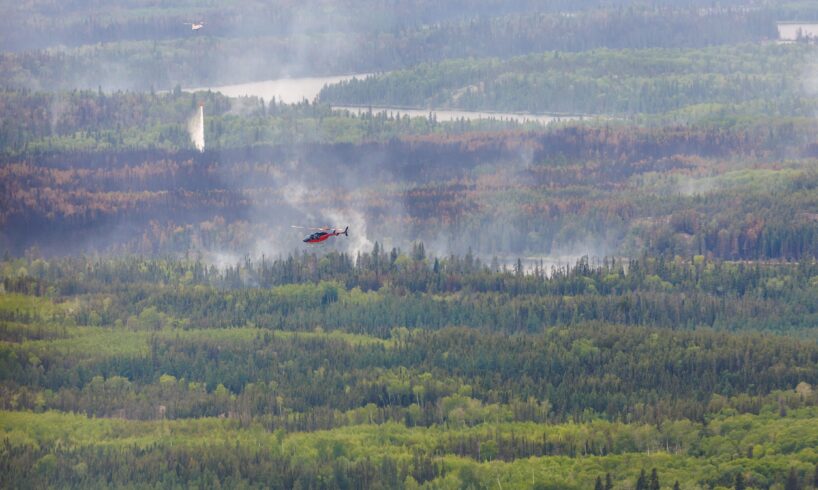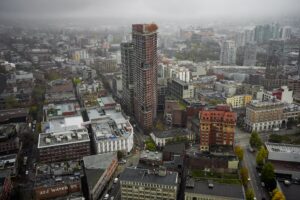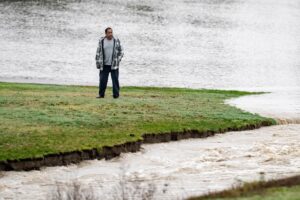
Open this photo in gallery:
A helicopter crew works on a wildfire as another is shown flying by during a helicopter tour in Northern Manitoba near Flin Flon, on June 12.Mike Deal/The Canadian Press
More than two months after her entire Northern Manitoba community was forced to flee from a raging wildfire this summer, Beverly Baker has no idea when she will be allowed to go back home.
The flames near Leaf Rapids, a scenic town with a population of 350, have been under control since last month. Evacuees were being prepared to return this week. But on Friday, residents were told they will have to wait even more – at least until October – because their homes are no longer habitable.
According to health officials, the properties are considered a biohazard. Power was cut off from Leaf Rapids on Aug. 1, leaving rotting food and black mould.
Residents, however, were not made aware of those concerns until moments before many of them were about to travel on nearly 13-hour bus rides and shuttles from Winnipeg, just under 1,000 kilometres away from the community.
“We’re living in a constant state of anxiety. And nobody is listening because a majority of us are First Nations peoples,” Ms. Baker told The Globe and Mail. “How is it our fault that this fire happened and it became mandatory to leave?”
Canada doesn’t have a national wildfire agency. This fall, Ottawa is poised to decide whether to build one
Hailing from Granville Lake, also known as Pickerel Narrows First Nation, Ms. Baker and her family of 13 have been in a Winnipeg hotel since early July, when evacuations were first ordered in Leaf Rapids.
Many residents of the remote town along Churchill River are also from Granville Lake, while others are band members of nearby O-Pipon-Na-Piwin Cree Nation and Nisichawayasihk Cree Nation.
Leaf Rapids, on Friday, extended its localized state of emergency until Oct. 4 because of the uninhabitable homes. Officials asked residents to fill out authorization forms if they wish to have their refrigerators removed or disposed, noting that “perishable food left in them are a biohazard.”
The town posted on social media that anyone in breach of the evacuations may be arrested, issued a fine for at least $1,296 and escorted away.
Ervin Bighetty, manager of the Leaf Rapids Co-op, finds it hard to forget the stench. He was back in town a few days ago, working with suppliers to have enough food in his store for the returning community, when he saw the vile spoilage.
“There are infestations of flies,” Mr. Bighetty said by phone from Thompson, Man. “It’s really as grim as it gets.”
Wildfires push thousands from homes in Manitoba, Newfoundland, while areas of Nova Scotia on high alert
Raymond Meunier, who has also been evacuated in Winnipeg, said waiting for updates is the most frustrating part.
“Even before this week, we’ve been asking not just the town for answers, but also the federal and provincial governments,” he said.
Currently in his second hotel for evacuees, Mr. Meunier recently spent his 50th birthday away from most of his family. “I’ve been getting any updates about my home from people who are scared to even say their names out loud because they’ll be given a fine they just can’t afford. It’s like the town is hiding things,” he said.
“I remember when many of us Indigenous people moved to Leaf Rapids a few decades ago,” he added. “It was mostly Caucasian people there, promising the future. Now, it’s crickets from those in charge because we’re a larger population there.”
Town officials declined to comment.
Leaf Rapids has not had a mayor or council for years. It has been managed by provincial administrators after several council members resigned in 2019 because of what they described as internal mismanagement and alleged misappropriation of town-related funds.
In a statement to The Globe, Manitoba government spokesperson Caedmon Malowany said the safety of residents in Leaf Rapids is a “top priority.”
“But unfortunately more work needs to be done to prepare the community for the safe return of its residents,” he wrote. “This additional time will allow Manitoba to provide more support for returning residents.”
Opinion: When a wildfire threatened my hometown, I realized the places you love can disappear in an instant
Manitoba Hydro spokesperson Peter Chura said the Crown corporation has restored power for its customers in the area.
He said the outage was caused by “wildfires that damaged or destroyed 12 wood pole structures on the transmission line serving the community.” Hydro crews began their repair work after they obtained clearance from the Manitoba Wildfire Service.
“We discovered some damage to underground electrical infrastructure in the community likely caused by heavy machinery working in the area during firefighting efforts,” Mr. Chura wrote in an e-mail.
Power was back by Sept. 9 after the repairs, he added.
But residents in Leaf Rapids told The Globe the service remains patchy.
“This kind of thing has been happening for a while now,” Mr. Meunier said. “They say one thing, and it’s another fact on the ground. We’re used to landlines because we have no cell service. We’re back to spotty hydro in modern-day Canada, where we have no safe drinking water, our community living under boil-water advisories. But everything’s fixed, isn’t it?”
The province declined to say whether it will help the community build back their homes or provide residents with new fridges.
“We are working with the local leadership of Leaf Rapids to determine what those needs are,” Manitoba spokesperson Mr. Malowany noted.
Federal Northern and Arctic Affairs Minister Rebecca Chartrand, whose Churchill—Keewatinook Aski riding includes Leaf Rapids, did not respond to requests for comment. She is hosting an online session next week to provide more information about the effects of recent wildfires.
Manitoba bore the brunt of this year’s wildfire season in Canada, declaring two separate provincewide states of emergency in May and July, the latter of which – after being extended for weeks – ended in late August. More than 2.1 million hectares of land was scorched across the Prairie province, with some areas still burning.





